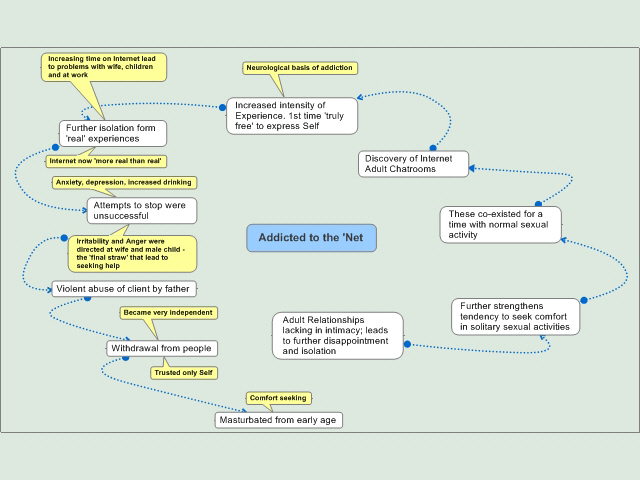|
|
||
| You Are Here: Counselling > Info Base > Sexual Addiction Therapy & Treatments | ||
Home Page Anxiety Assertiveness Depression |
||
Summary
|
||
Sexual Addiction Therapy and Treatments Assessment When a new client comes along the most important first step is to evaluate the situation before deciding how best to proceed. This is a joint process and a co-operative one between me and the potential client. My aim is to start the process of helping the client to start to feel a sense of empowerment and to regain control, so 'telling' them what to do will not achieve this! During the evaluation phase, which may several sessions, we discuss the problem behaviours and the consequences. I will be using my knowledge and experience, not just of sexually compulsive behaviours but also of the whole range of presenting issues in order to accurately and appropriately make an assessment. It is important to distinguish between those behaviours that can best be described as addictions and other forms of problem that, whilst having an element of compulsion and lack of control, are not addictive in nature. I will therefore need to gather information on the nature, time of onset, duration, frequency, and the progression of the experienced problems. We will also discuss the 'bigger picture' including family situation, sources of support, personal strengths and any other problems or stresses in your life. Your family background and any problems during childhood are also important elements of this process of understanding who you are and what you brings to the situation you find yourself in. Finally I will attempt to create an understanding, for both of us, of your 'position' in relation to the need for action and change. Change is difficult and various stages of readiness to change in relation to problems are recognised by therapists. There are actions that can be taken at each of these stages and different goals and approaches to therapy are appropriate to each. Formulation Assuming that counselling is appropriate for
your situation, we will then go on to develop a formulation; this is a shared
understanding of how the problems were created and how they are sustained.
Developing an awareness of of what is going on, why and how you may be inadvertently
making things worse help provide the basis for action. It is important to develop a detailed understanding of what caused your problem, what maintains it and the relationship between different aspects of it. We develop this together and a graphical representation, or map, like the one shown above can be one result. |
||
Goals & Strategies It is important that, between us, we identify clear goals for the therapy. These need to be highly specific and having created the formulation, we are usually able to achieve this because you have a 'map' of the problem. So, for example, 'I want to stop doing X' isn't really a clear enough goal. However, recognising the problems that cause 'X' helps you to set therapy goals that address those causes. There may, for example, be a communication problem with a partner that leads to feelings of isolation that you have then attempted to assuage by developing unhelpful responses or behaviours. One goal then may, for example, be to address these communications difficulties and we can look at strategies to achieve this. Often times, these goals need to break down into sub-goals; before you can address communications problems, you may need to recognise the problems you have yourself, for example, in expressing feelings. A sub goal might be to find out why and another might be to develop this part of yourself. Each of the goals will have strategies associated with it it. In these examples, strategies might include; including the partner in some sessions to help define the issues in communications, exploring what expressing feelings symbolises for you and problems in the past when you have done so, exploring the perceived advantages of not communicating and checking whether you still need these today, coaching on communications skills and gradually practising and therefore strengthening those skills. I stress that these are just examples of one specific thing in order to illustrate a point; actual goals and strategies need to be as individual as you are! The Work of Therapy Having got this far we can then embark upon our therapeutic journey together. In this type of work, this may involve medium to long term counselling of from 9 months to 2 years or sometimes more. As in all therapy, the relationship is of critical importance, which is why it is important to select a therapist that you feel very comfortable with. The actual sessions can vary in theme, approach and content. Common components are
If you would like to arrange for an introductory meeting, please contact me by clicking here. This links to a page offering email and telephone contact. Sessions are offered in a private, quiet and discreet location, in peaceful and tranquil surroundings. Early morning and evening sessions are available. Naturally, I will keep the contents of our sessions completely confidential, subject to the requirements of English law.
|
||
(Page last updated 20 March 2013)
|
